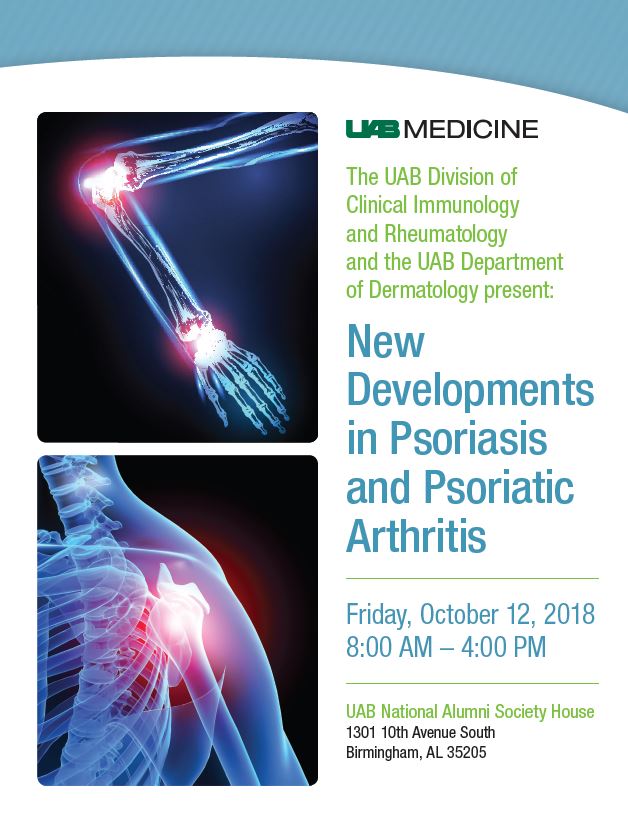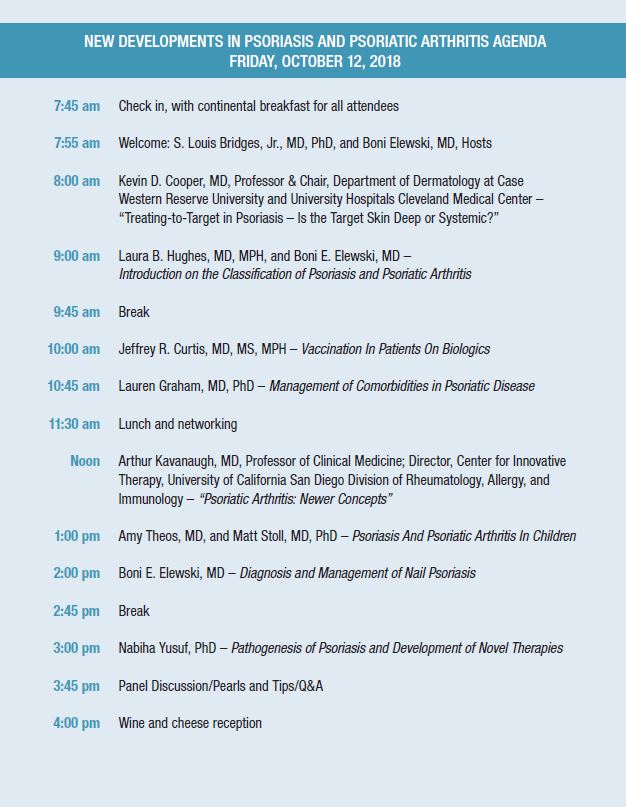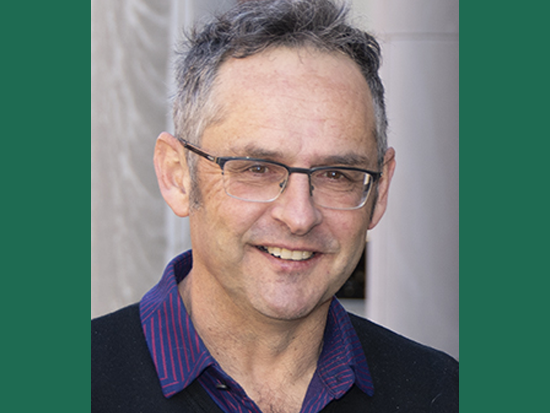 Tony Merriman, PhD, FRSNZTony Merriman, PhD, FRSNZ, professor in UAB’s Division of Immunology and Rheumatology and internationally recognized leader in the genetic basis of gout, published “A genome-wide association analysis reveals new pathogenic pathways in gout” in the journal Nature Genetics.
Tony Merriman, PhD, FRSNZTony Merriman, PhD, FRSNZ, professor in UAB’s Division of Immunology and Rheumatology and internationally recognized leader in the genetic basis of gout, published “A genome-wide association analysis reveals new pathogenic pathways in gout” in the journal Nature Genetics.
The study's most significant outcome is identifying 148 previously unreported loci in urate and gout. This gives researchers promising targets to help address gout, a painful form of arthritis currently estimated to affect roughly 56 million people worldwide, the rate is expected to rise over 70% in the next 30 years.
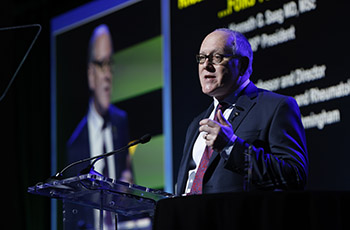 Dr. Ken Saag, 2022 ACR PresidentKen Saag, MD, MSc, delivered a stirring presidential address at the American College of Rheumatology annual meeting in October 2022.
Dr. Ken Saag, 2022 ACR PresidentKen Saag, MD, MSc, delivered a stirring presidential address at the American College of Rheumatology annual meeting in October 2022.
While COVID-19 continues to pose special risks to immunocompromised patients, he said, it is beginning to feel as though the field is entering a phase beyond the pandemic, which brings new challenges.
“We now see non-clinical work as less constrained by time and space,” he said. “Many of our administrative and research staff and faculty, particularly in our academic, industry and government centers, view at least partially remote work as a key job benefit. While this no doubt improves work-life balance for some, it’s led to a stifling of the water-cooler discussion, which has challenged our ability to innovate.”
The Great Resignation has brought on a need for hiring quality new staff, “who have been very tough to find,” he said.
The ACR is situating itself to meet these challenges, he said. The structure of Board of Directors meetings now encourages “more intimate discussions.” And new ACR membership models will allow for small teams of healthcare providers to join. Live meetings will continue to be complemented by virtual options to encourage maximum attendance.
The RISE registry will continue to help with research, he added, indicating it now includes data equivalent to 3 million patients and 30 million visits.
The top challenge may be the rheumatology workforce shortage, with an estimated 40–50% of current U.S. rheumatologists expected to retire in the next 10 years, leading to a 25% reduction in the workforce.
“This constitutes an existential threat to our care for an increasing number of patients, resulting, in part, from a global silver tsunami,” Dr. Saag said. An ACR Workforce Solutions Committee is working on solutions to grow and sustain this workforce.
Burnout, limited interactions of trainees with scientists, demoralized scientists due to lost funding, and debt that limits career choices are all reasons for workforce shortages and low numbers of physicians doing scientific research, he said.
“Simply put, we need more funding, but in particular we must support those doing team science and translational research of greatest public health relevance,” he said.
The ACR is also working on diversity, equity, inclusion and accessibility issues with leadership development conferences, an ACR Convergence reception for under-represented medical professionals, and a new ACR subcommittee and diversity director, he said.
“We need to be a more representative specialty to enhance trust,” he said.
Rheumatologists also play a role in helping to dispel the mistrust of science that blossomed during the pandemic. Dr. Saag said the College’s positions should be science based and not veer too far into the political.
“When society takes a wrong turn, and medical professionals go along, mistrust in medicine grows,” he said.
“Express your true opinions—if I can get my reticent patients in Alabama to take badly needed COVID vaccines, trust does matter. And our trusted expertise influences our patients’ actions,” he said. “Our lane, and the lanes of other medical organizations, are widening, and the ACR cannot and should not shy away from controversy. We should be doing this while representing our members fairly.”
Despite the challenges to medicine and science over the past three years, Dr. Saag remains optimistic about the future of rheumatology. He looks forward to working with his successor and ACR elected leaders to forge new paths to improve the quality of life for patients with rheumatic diseases.
This article appears courtesy of The American College of Rhreumatology.
 Kenneth Saag, M.D., Msc, delivering the Presidential Address at the 2022 American College of Rheumatology Annual MeetingThe UAB Division of Clinical Immunology and Rheumatology has been ranked among the best in the nation by the U.S. News & World Report in its 2023-2024 Best Hospitals Rankings. Earning the number 10 spot again this year, the division celebrates twenty consecutive years being ranked among the top 12 rheumatology programs in the nation.
Kenneth Saag, M.D., Msc, delivering the Presidential Address at the 2022 American College of Rheumatology Annual MeetingThe UAB Division of Clinical Immunology and Rheumatology has been ranked among the best in the nation by the U.S. News & World Report in its 2023-2024 Best Hospitals Rankings. Earning the number 10 spot again this year, the division celebrates twenty consecutive years being ranked among the top 12 rheumatology programs in the nation.
Division Director Kenneth G. Saag, M.D., MSc., attributes the longstanding record of excellence to the vision and dedication of the entire healthcare team. “There is a history here of extraordinary physician-scientists who translate the latest discoveries into therapies that improve the lives of our patients. From to Claude Bennett, to Bill Koopman, to Bob Kimberly, to Lou Bridges, we have had an extensive line of distinguished leadership who paved the way to new understanding of gout, arthritis, and lupus. This foundation has provided stellar environment for Jeff Curtis, Jasvinder Singh, Maria Danila, Amanda Alexander, Angelo Gaffo, and more like them to thrive here at UAB. We could not be prouder of this incredible legacy and how it’s been recognized nationally by this ranking.”
The 2023 rankings comprised approximately 4,500 hospitals, which represent virtually all United States community inpatient facilities.
“Being recognized in this year’s list is a mark that the consistent excellence of our patient care and the innovative therapies offered here continue to make UAB a key healthcare destination,” said Dawn Bulgarella, CEO of UAB Health System..
These rankings come on the heels of UAB Medicine welcoming almost two million patients last year, as the organization continues to expand its presence throughout the state to improve access to health care for Alabamians. In addition to rheumatology, seven other adult specialties are ranked among the top fifty, and five other programs were classified as “high-performing.”
"UAB Hospital remains the best hospital in Alabama, Birmingham metro, according to U.S. News & World Report " can be found at UAB News online.
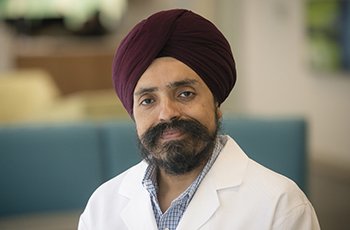 Dr. Jasvinder Singh, senior authorMany genome-wide association studies (GWAS) have begun the work of identifying genetic loci of osteoarthritis. This study, comprised of 484,374 participants from diverse ancestries and ethnicities, is a major step toward addressing the underrepresentation of non-European descendants in studies on OA genetics.
Dr. Jasvinder Singh, senior authorMany genome-wide association studies (GWAS) have begun the work of identifying genetic loci of osteoarthritis. This study, comprised of 484,374 participants from diverse ancestries and ethnicities, is a major step toward addressing the underrepresentation of non-European descendants in studies on OA genetics.
This mega analysis published in Nature Genetics involved the largest multi-ancestry cohort to date, which provided the needed statistical power to identify previously unknown loci in populations of both European and non-European descent. Large sample sizes, especially those of ethnically diverse patient populations, are needed to continue progress toward developing OA interventions and improving patient care.
Currently, no effective medical interventions other than symptom management are available for osteoarthritis (OA). With no effective medical interventions for disease modification available, OA often progresses to its end stage, at which time only surgical options are available. Understanding genetic influences could lead to personalized treatments that would prevent or delay the need for end-stage interventions such as total joint replacements.
The study's drug repurposing findings support physicians’ intuition regarding OA pain and anti-epileptics, anti-neoplastic agents, and anti-acne preparations. Several OA-associated loci provide etiological foundation for repurposing such drugs.
More studies, especially those with large cohorts such as this one, are needed to determine how this information can be used most effectively in the treatment of OA symptoms.
"Osteoarthritis: Multi-ancestry analysis reveals novel genetic loci associated with the disease" can be found at UAB News online. UAB researchers from multiple departments contributed to the investigation.
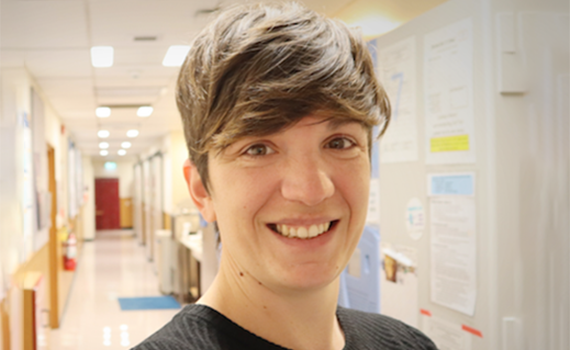 Megan Leask, Ph.D., InstructorMegan Leask, Ph.D., has received an NIH/NIAMS Competitive Diversity Supplement for an existing R01 awarded to Dr. Richard Reynolds for her research titled, "Functional and Integrative OMICS of Recurrent Gout Flares.”
Megan Leask, Ph.D., InstructorMegan Leask, Ph.D., has received an NIH/NIAMS Competitive Diversity Supplement for an existing R01 awarded to Dr. Richard Reynolds for her research titled, "Functional and Integrative OMICS of Recurrent Gout Flares.”
Leask is Indigenous Māori from New Zealand who joined her mentors Drs. Richard Reynolds, and Tony Merriman, in the Division of Clinical Immunology and Rheumatology a year and a half ago as a Scientist II.
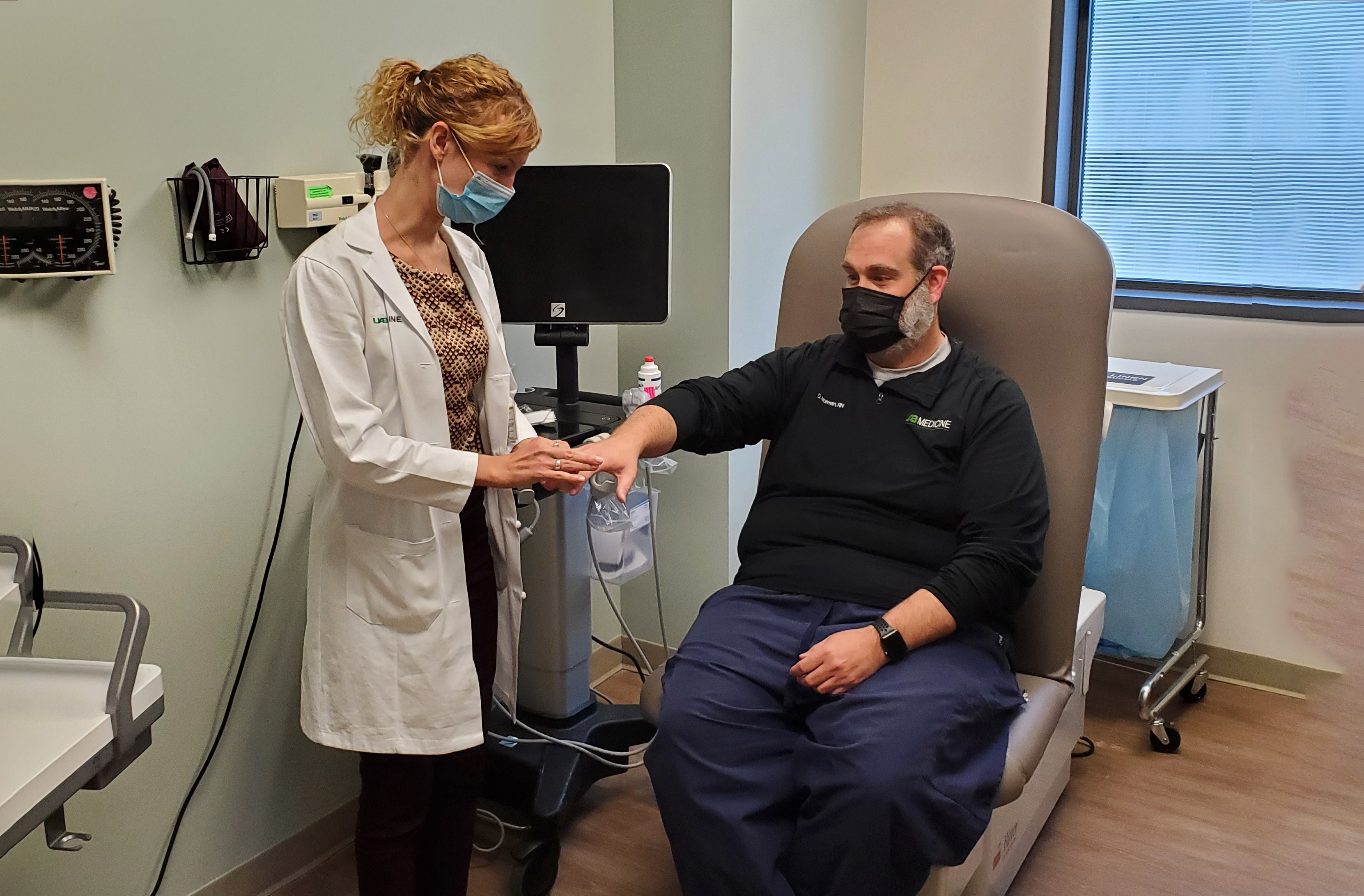
The American College of Rheumatology is the premier society for the advancement of rheumatology in the U.S. This year’s ACR President, a newly designated Master, and a Distinguished Fellow all call UAB home.
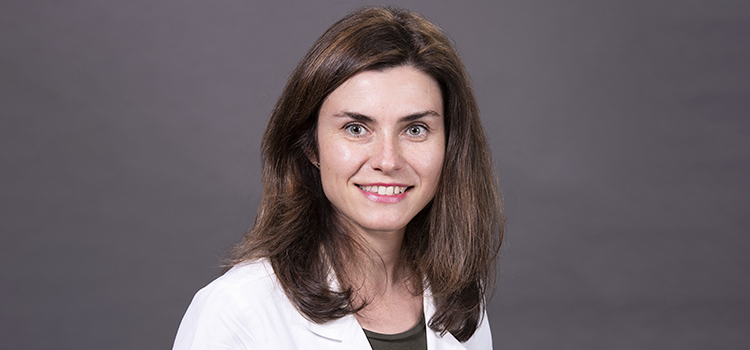 Maria I. Danila, MD, MSc, MSPH
Maria I. Danila, MD, MSc, MSPH
Our understanding of how to best use telemedicine for rheumatology patients began with our need to care for patients with chronic illness during the height of the COVID pandemic.

How can physicians help patients with rheumatoid arthritis when methotrexate fails? It was hoped that a new class of oral medication held the answer, but the FDA issued a black box warning for JAK inhibitors last year citing major adverse cardiac events and cancer as safety concerns. UAB’s Dr. Jasvinder Singh is seeking a definitive answer.

Dr. Jeffrey Curtis wants to use virtual reality to help patients with rheumatoid arthritis experience how the disease may worsen over time in the future to improve shared decision making about their treatment choices in the present.

Associate Professor Maria Danila, MD, MSc, MSPH has received an Innovative Research Award from the Rheumatology Research Foundation. She will investigate how increased tele-rheumatology due to COVID-19 impacts the health outcomes of patients with rheumatic and musculoskeletal diseases.
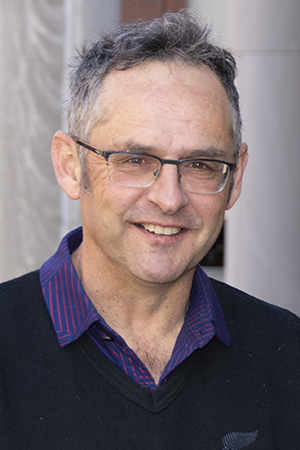 Dr. Tony MerrimanProfessor Tony Merriman, PhD, FRSNZ, joins our faculty from the University of Otago in New Zealand. Dr. Merriman is an internationally recognized scientist and leader in the genetic basis of gout and rheumatoid arthritis.
Dr. Tony MerrimanProfessor Tony Merriman, PhD, FRSNZ, joins our faculty from the University of Otago in New Zealand. Dr. Merriman is an internationally recognized scientist and leader in the genetic basis of gout and rheumatoid arthritis.
Dr. Merriman's research interests also include outcomes in gout, especially severity and drug response. He also applies genetic epidemiological techniques to understanding the causal relationships in gout, specifically of diet to hyperuricemia, and of gout to related co-morbidities. These approaches have both immediate impact on clinical practice, such as the role of diet in management approaches, as well as implications for longer term management of gout by potentially identifying drug targets. As part of his research, Dr. Merriman has demonstrated a commitment to inclusion of minority groups in genetic studies.
Dr. Merriman obtained a PhD in bacterial genetics from the University of Otago in 1993. This was followed by four years post-doctoral training in the genetics of type 1 diabetes at the University of Oxford. In 1998, he returned to New Zealand, where he first developed a program in genetics of rheumatoid arthritis which developed into his current research program.
In 2020, Dr. Merriman joined the facuty at UAB, to join the division in its world-leading clinical research in gout.
Dr. Merriman retains his faculty appointment at the University of Otago.

According to a 2019 Pew Research Study, about one in five U.S. adults regularly wears a smart watch or wearable fitness tracker. This trend is producing a wealth of health data that can be leveraged to improve medial practice and scientific research.
The Building and InteGrating Digital heAlth Technology and Analytics (BIGDATA) Core Center for Clinical Research (CCRCR) at UAB is an NIH-funded center that aims to harness these technologies—and the data they generate—and make them available to support a broad base of investigations. The Center is composed of three distinct cores, each of which brings innovative tools, expertise and methods to the research community to effectively advance rheumatologic, musculoskeletal, and skin diseases research.
Professor Jeffrey Curtis, MD, MS, MPH, is the principal investigator of this four-year, $3 million grant.
BIGDATA: 3 Synergistic Cores
Aim 1: Promote outstanding, innovative, and synergistic disease-focused research and expedite clinical, translational and informatics-related projects through the utilization of our Methodologic Core composed of a diverse team with expertise in biostatistics, bioinformatics, clinical informatics, statistical genetics, epidemiology, computer science, health economics, and implementation science. David Redden, PhD, directs the Methodologic Core with Associate Director Lloyd Edwards, PhD.
Aim 2: Foster the development, refinement, and application of existing and de novo digital technology data capture and analysis tools integrated with traditional data sources to advance research in rheumatologic and musculoskeletal diseases through our Data Capture and Integration Core. James Willig, MD, MSPH directs the DCI Core with Associate Director Maria Danila, MD.
Aim 3: Promote the training of both junior and established clinical and translational investigators in the current methods of clinical informatics and digital health tools through diverse enrichment activities overseen by our Administrative Core. Jeff Curtis, MD, MS, MPH, directs the Administrative Core with Associate Director Huifeng Yun, PhD.
BIGDATA CCCR is funded by a P30 grant from NIAMS.
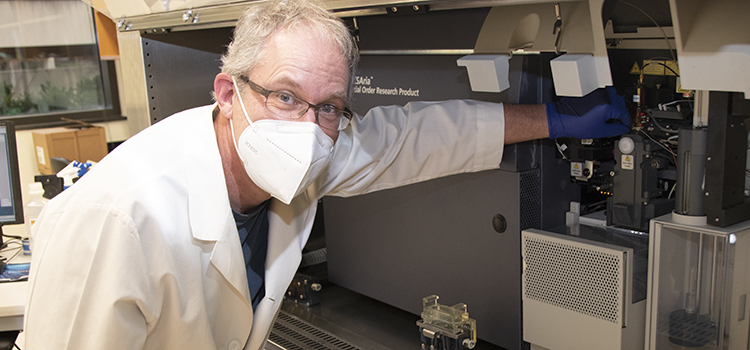 Dr. Troy Randall with cytometry equipment.
Dr. Troy Randall with cytometry equipment.
The idea that cells are the unit of life began when Dutch scientist Antonie van Leeuwenhoek looked under a microscope. He was the first to observe that tissues were composed of tiny chambers—cells—that worked together to make a functional organ. Three hundred years later, this knowledge underpins all of modern biology.
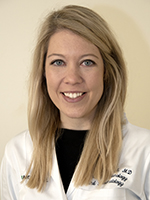 We are delighted to welcome Amanda Schnell, MD, to the Division. Dr. Schnell has been appointed Assistant Professor of Medicine and will see patients in the Rheumatology Clinic at The Kirklin Clinic.
We are delighted to welcome Amanda Schnell, MD, to the Division. Dr. Schnell has been appointed Assistant Professor of Medicine and will see patients in the Rheumatology Clinic at The Kirklin Clinic.
As a clinician-educator, Dr. Schnell brings both compassion and expertise to her general rheumatology practice, which includes ultrasound-guided procedures and diagnosis. She will build upon her recent fellowship experience in our program to the continued training of our rheumatology fellows as an Associate Program Director.
One special area of patient care for Dr. Schnell will be building the UAB scleroderma program in collaboration with the Department of Dermatology and the Division of Pulmonary, Allergy, and Critical Care Medicine. As a designated Scleroderma Center of Excellence, UAB has been recognized by the Scleroderma Foundation’s National Medical Advisory Board for demonstrating expertise in scleroderma including clinical and laboratory-based research, conducting clinical trials and educational activities about scleroderma, and providing information about the advances in the care and treatment of patients with scleroderma to health care professionals and the public.
“One of the simplest ways we can support scleroderma patients is providing warm gloves for patients who cannot afford them. It is an act of kindness that provides a tremendous impact on people who are struggling with this chronic condition. Finding ways to alleviate their pain motivates me to pursue research that can ultimately cure scleroderma for good,” Schnell comments.
Dr. Schnell received her medical doctorate from the University of Nebraska College of Medicine in 2013. She completed her residency training, including a year as Chief Resident, at the University of Kansas Medical Center in 2017. She is board certified in internal medicine and rheumatology. Dr. Schnell is also active on the American College of Rheumatology Government Affairs committee, where she is committed to advocacy for all her patients.
Welcome to UAB and the Division of Clinical Immunology and Rheumatology, Dr. Schnell!
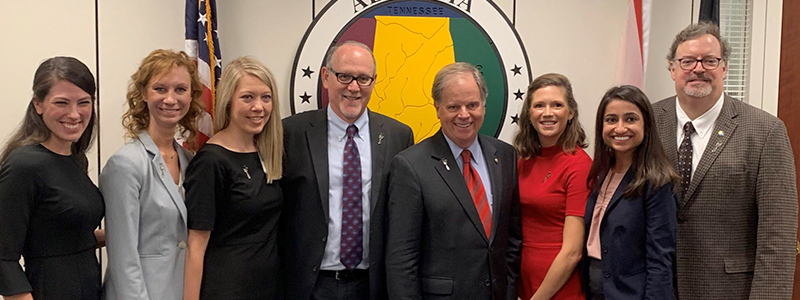
Maggie Guthrie, MD, Lesley Jackson, MD, Amanda Schnell, MD, Kenneth G. Saag, MD, MSc, Courtney Crayne, MD, Nitasha Khullar, MD, and S. Louis Bridges, Jr., MD, Ph.D. were part of group of more than 100 patient advocates and individuals from The American College of Rheumatology Advocacy Center who visited Washington, D.C. earlier this month, to urge federal lawmakers to support the Safe Step Act, Empower for Health Act, and the REDI Act. The team of UAB advocates met with Sen. Doug Jones (AL) who has supported the Safe Step bill.
Read more
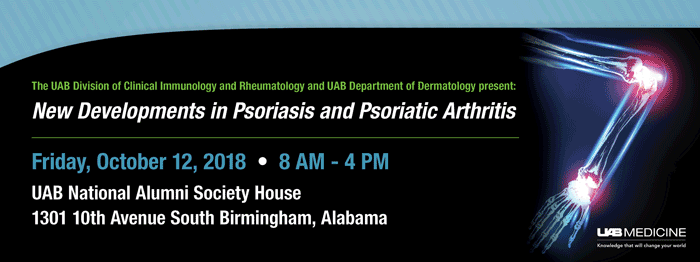
Borrowing from principles used in rheumatoid arthritis and psoriasis management, current guidelines recommend that the overarching goal in the treatment of patients with psoriasis and psoriatic arthritis be the achievement of remission or minimal disease activity in a treat-to-target approach. To aid in achieving this goal, a wide range of new therapies with good clinical efficacy and safety have been, and continue to be, developed. There is a need for clinician education to improve the knowledge of the efficacy and safety profiles of these new and emerging agents, as well as how to approach treatment selection for patients with comorbidities.
Please click on the image below to access the brochure
For more information or to register, please contact:
Stephanie Ledbetter
Phone: (205) 934-7423
Email: sledbetter@uabmc.edu
Cancellation
There will be a $50 cancellation fee for cancellations received prior to September 15, 2018, after which time there are no refunds. UAB reserves the right to cancel or reschedule the conference due to unforeseen circumstances.
CME Certification/PRA Credit- Physicians
The University of Alabama at Birmingham Heersink School Of Medicine is accredited by the Accreditation Council for Continuing Medical Education to provide continuing medical education for physicians. The University of Alabama at Birmingham Heersink School of Medicine designates this education activity for a maximum of 6.25 AMA PRA Category 1 Credit(s)™. Participants should only claim credit commensurate with the extent of their participation in the activity.
